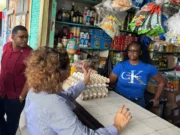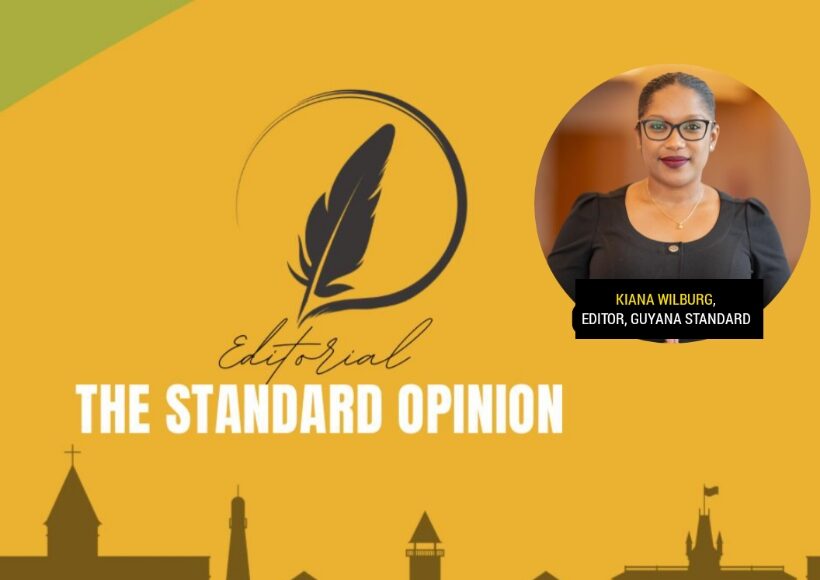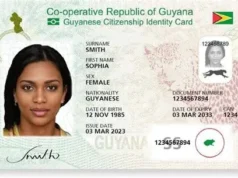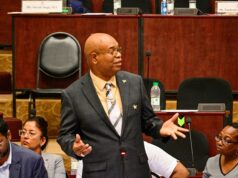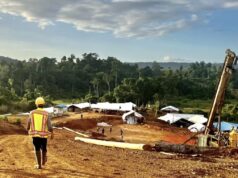By Kiana Wilburg
When U.S. President, Donald Trump, addressed the United Nations General Assembly last week, he said: “This is indeed, the ‘Golden Age’ of America…Growth is surging. Manufacturing is booming. The stock market, as I said, is doing better than it’s ever done…”
I immediately pondered the Guyana context. Are we in our “Golden Age” of prosperity, given massive investments in healthcare and education, social development, and policies to stimulate growth in the non-oil economy?
The evidence suggests this is our intention; that we are on the pathway to doing so.
With the elections now over, the real work begins in monitoring how the government utilizes our nation’s oil wealth to drive social and infrastructural transformation. I do believe these two things must go hand in hand if we are to ensure the “Golden Age” is more than just numbers and concrete structures; more than just jaw-dropping revenue collection, record-breaking production, and the novelty of brick-and-mortar spending.
So what should we keep our eyes on?
The transformation of our banking system has to be at the forefront of our minds. Just as most of our politicians have accepted that the electoral strategies of the 90s and 2000s are sorely outdated when trying to reach Generation Alpha, we must also address our minds to not being stuck as an analogue player in a digital world. We have to support and ensure a massive overhaul of our banking systems.
Just days after being sworn in, President Irfaan Ali met with stakeholders in the local banking sector to discuss kinks in the system. He is expected to receive a report, by the third week in October, outlining what the financial sector requires to realise the Government’s vision for a digital economy. I would urge readers to keep this topic top of mind since financial inclusion is a crucial pillar in social development. The ease with which citizens can access loans to realise their entrepreneurial pursuits, as well as the inability of the unbanked to carry out transactions such as savings and bill payments, are important metrics in the social development and empowerment conversation.
Simultaneously, the government has announced plans to establish a Small and Medium Enterprise Development Bank which will provide micro-credit loans at zero interest, along with mentorship and support where appropriate. President Ali, at his first press conference on September 16, said a team was appointed to work on this. We now need to know who are the persons involved, the vision of their team leader, and what targets they are working with. These fundamentals should be made public; perhaps the Vice President, Dr. Bharrat Jagdeo, would be open to providing more colour on this front. If realised, I do believe it would be an astounding initiative that complements ongoing efforts to ensure Guyanese tap into opportunities for wealth creation.
Education is another important prong. The government has promised more resources for the University of Guyana to prioritise science, technology, engineering, and mathematics (STEM). There is also the promise to ensure every region has a special education needs (SEN) facility, along with the expansion of day and night care facilities in all regions so parents do not have to choose between paid employment and their children’s wellbeing. By investing in STEM and inclusive learning facilities, we undoubtedly empower our citizens to participate meaningfully in the emerging prosperity while setting the stage to ensure our “Golden Age” shines on all corners of our country.
An equally important component on the education front is building out a society that is led by individuals with a shared value system; one that speaks to a collective effort to care for the elderly and vulnerable groups; one of respect and tolerance to differing viewpoints; one of true social cohesion. The government said it plans to tackle this through civic education roll out in schools. It was noted that the religious leaders will be consulted in the preparation of the curriculum that will be used to pass on the refined value system we want our citizens to embody. Readers should keep this on their list and raise questions about how soon this will be tackled.
Another important metric pertains to the cleanliness of our country and the restoration of Georgetown. President Ali has said this will be done and 15 projects are expected to be rolled out. The Kings Foundation and other key stakeholders will be helping Guyana on this front. This collaboration is expected to see the revival of historical landmarks, modernized market spaces, and the adornment of our city with pictoral storytelling of who we are and from whence we came. I do believe this approach is one powerful means by which we can not only celebrate our “Guyaneseness” but also tap into innate ability of our citizenry to preserve and protect that which seems directly part of our identity.
With regard to youth, the government has promised to create greater opportunities for their participation in government, the private sector, and every facet of national life. Support for youth entrepreneurship and innovation was also part of the government’s manifesto. The task ahead now is to provide citizens with a detailed picture of what this will look like over the next five years.
Two other crucial pillars for realising the social development component of the “Golden Age” are modernised health care and accelerated access to quality housing. In addition to the completion and full operationalisation of state-of-the-art health facilities across every region, the government has promised to recruit and train more healthcare professionals, including medical specialists and at least 6,000 nurses over the next five years. The public should also keep a close watch on these plans, among others. When healthcare services are accessible and of high quality, it has the advantage of reducing disparities and promoting societal well-being, undoubtedly a cornerstone for achieving sustainable prosperity.
Expansion of the housing programme is also crucial, but the government’s target of 40,000 homes in five years must not come at the expense of quality. Sacrificing standards would only hamper the integrity of this initiative, which is a crucial marker of the “Golden Age” of prosperity.
Last but certainly not least, we must engage in a collective effort to address domestic violence. The government has pledged to expand its programme through legislation, training, and sensitisation. The violence we have witnessed this year against our women has been gut-wrenching. We can no longer afford to keep a toe in this issue; we must go all in as a nation—sharing information, having difficult conversations, and pushing for concrete change. Whatever individual efforts we can make, we must maintain faith, for inaction is no longer an option.
The foregoing is just the tip of the iceberg regarding the challenges and opportunities facing our country — all waiting to be addressed before we can confidently claim that we have arrived at our Golden Age. Be that as it may, the evidence suggests that this is where we want to go, and that we are putting in the work. Reaching the “Golden Age” of prosperity won’t happen overnight. But we all have a part to play by holding accountable those we elected to get us there.



